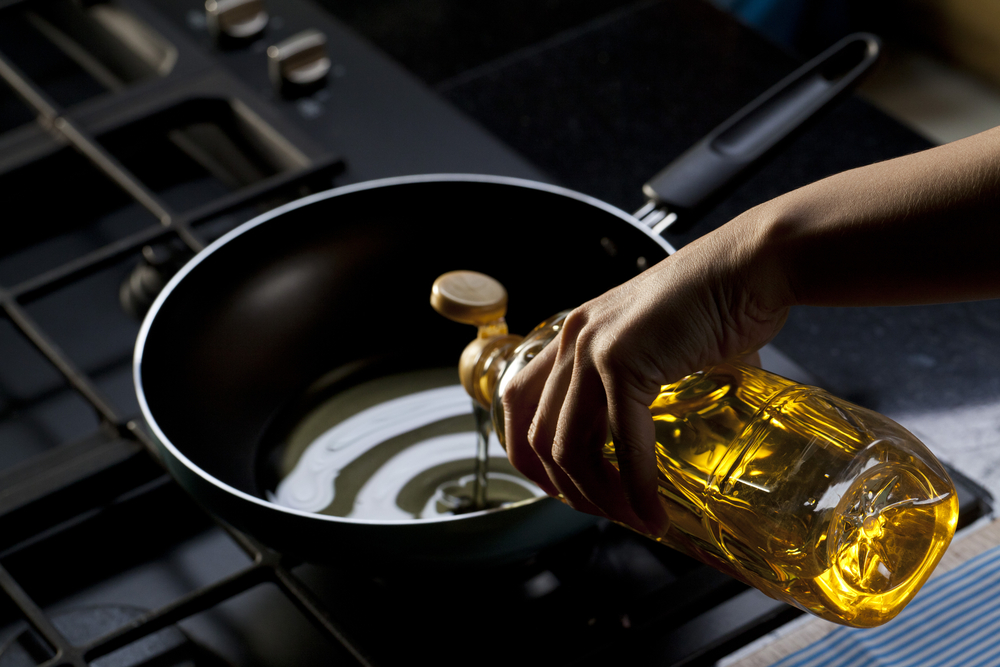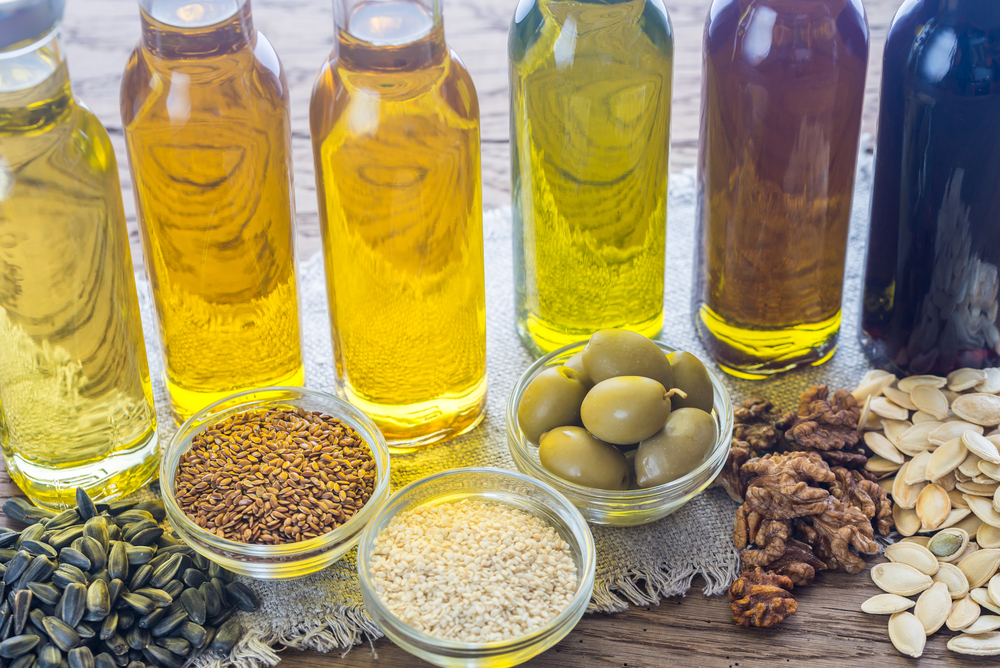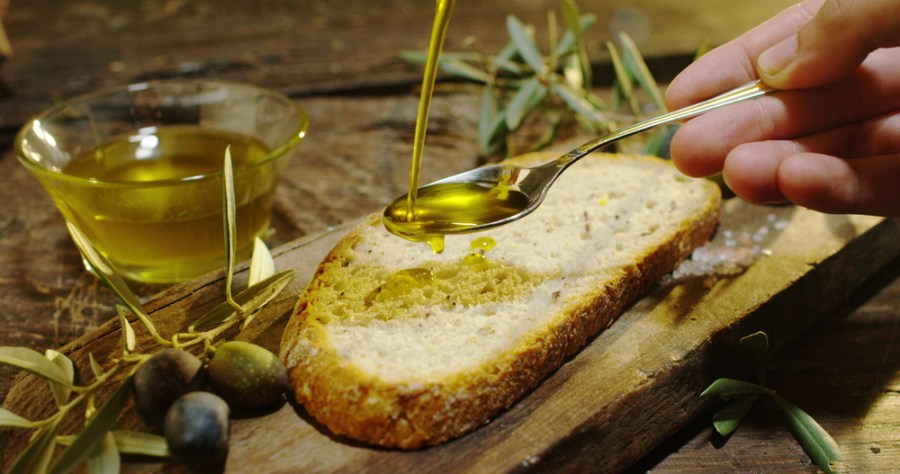Butter, coconut oil, vegetable oil, olive oil? Confused about which oil you should cook with? Nutritionist and Chef Christine Bailey reveals the healthiest oils to be used in the kitchen.
Is it time for an Oil Change? For years people have been encouraged to use more polyunsaturated fats like vegetable oils for cooking while shunning more traditional fats like butter and ghee. So what are the healthiest options when it comes to cooking oils?
Why the Smoking Point Matters
Some fats and oils are ideally suited for cooking over high temperatures, while others are better for use over low or no heat. The smoke point of a fat or oil is
the temperature at which the oil will burn and become damaged. When we heat oils past its smoke point, that fat starts to break down chemically producing free radicals and lipid peroxidation which has been associated with various health conditions including heart disease. Damaged fats are not great for our health generally promoting inflammation in our body.

Smoke points for a fat or oil can vary depending on the quality and variety of the ingredients, and on whether the fat or oil has been refined. Saturated fats like ghee, lard and coconut oil are relatively stable fats and have a high smoking point. But that doesn’t mean you cannot use other oils for high temperature cooking. Unsaturated fats can be divided into mono and polyunsaturated according to their chemical structure. While the fatty acid composition of an oil influences its smoking point so do other components including the presence of antioxidants like vitamin E, phytosterols and phenolic compounds. This means many of these oils are equally suitable for cooking. For example, the smoke point of extra virgin olive oil (a monounsaturated fat) is surprisingly high partly due to its antioxidant content. Antioxidants help to make the oil more stable.
Quality Matters
For health, there are other considerations when it comes to choosing the best cooking oil. The more refined they are the less nutritional value they will generally contain. For example refined vegetable oils (like corn, soy, sunflower, vegetable) lack many of the additional health benefits of extra virgin or cold-pressed oils that are rich in antioxidants and plant sterols known for their many health benefits. Ideally, you want to choose an oil that is heat stable and provides additional health benefits too.
Getting the Balance of Fats Right
The right amount and type of fat are essential for our health. Currently, the government recommends that the total fat in our diet should provide us with no more than about one third (35 per cent) of energy from the food we eat each day, with a maximum of 11 per cent from saturated fat. Certain fats are known for their heart-healthy and anti-inflammatory benefits such as monounsaturated fats (olive oil, avocado oil) and the polyunsaturated omega 3 fats (e.g oily fish like salmon). While we do need some polyunsaturated omega 6 fat in our diet we can easily obtain these from whole foods like nuts, poultry, and avocados.

One of the concerns with the use of vegetable oils in our diet (e.g soya, corn, sunflower, vegetable oil) is that it has led to an overconsumption of omega 6 fatty acids at the expense of omega 3 and monounsaturated fats. When we consume excess omega 6 fats (which are also abundant in processed foods, margarine, fried foods etc) it can have an inflammatory effect in the body while at the same time reducing the availability of anti-inflammatory omega 3 fats in your tissues. We all know we should eat more omega 3 fats found in oily fish (like salmon, mackerel and sardines). But the truth is we don’t. The optimum ratio of omega 6 to omega 3 in our diet is around 6 or 4:1. The UK food intake surveys indicate that our actual ratio is around 10:1 meaning we are vastly overconsuming these fats. Switching from using vegetable oils in cooking to healthier options is one way to achieve a better balance in our diet.
Top Fats You Should be Cooking With
When it comes to cooking look at using unprocessed plant-based and animal-stable fats. Storage and shelf life are crucial with cooking oils. Store oils in dark, not clear, glass bottles and keep in a cool, dark place away from light and heat. Don’t store oils on kitchen counters or next to the stove.
Extra Virgin Olive oil
Olive oil is a traditional part of the Mediterranean Diet and has been used for centuries. It is rich in the antioxidant vitamin E and plant polyphenols and is known for its health-promoting properties. Being rich in monounsaturated fats it is heat stable and is a great choice for sautéing and roasting. Extra Virgin Olive oil has a higher smoking point (around 180-190C) but regular olive oil can also be used for lower-heat cooking.
Coconut oil
Coconut oil is about 90 per cent saturated fat which makes it very heat stable. Refined coconut oils tend to have a more neutral scent and flavour than virgin coconut oil making it less likely to overpower the flavour of your food. It also has a higher smoke point (around 220C) but both can be used for cooking. Coconut oil is great for baking and medium-high heat sautéing. It also contains medium-chain triglycerides such as lauric acid, a fatty acid that can be used by the body for energy. Many athletes for example use MCT oil as a performance aid during endurance training.
There is concern that too much coconut oil can raise cholesterol. While studies do show coconut oil can raise LDL (your so-called “bad” cholesterol) it has also been shown to improve the quality of the LDL and increases its particle size which may make it less likely to promote heart disease. It also raises HDL (“good” cholesterol). So while it doesn’t mean you should go overboard it is a great choice for cooking.
Cold Pressed Extra Virgin Avocado Oil
Considered by many to be one of the finest culinary oils. Yes, it does come from the green flesh of the avocado! It is rich in monounsaturated fats and oleic acid and packed with antioxidants like vitamin E and plant polyphenols. It has a more subtle, buttery taste than olive oil or coconut oil. It also has a high smoke point (255°c) making it ideal for high-temperature cooking.
Organic Butter & Ghee
Both butter and ghee are comprised mainly of saturated fat with a little monounsaturated fat. Grass fed / Organic butter is higher in conjugated linoleic acid, a type of fatty acid that may have a number of health benefits. They also provide some vitamin D and A and butyric acid known to help lower inflammation. Ghee has a higher smoking point at 400˚ to 500˚F and provides the same nutrients in grass-fed butter making it ideal for high-temperature cooking.
Extra-Virgin Cold-Pressed Rapeseed Oil
A light neutral tasting oil cold pressed rapeseed oil (which is different from refined canola oil) is another great choice for cooking. With a high smoke point of around 220C, it is suitable for all types of cooking as well as in dressings. A good source of vitamin E, plant sterols (known to help lower cholesterol) and polyphenols. Cold pressed rapeseed oil is low in saturated fat and a good source of monounsaturated fats.







